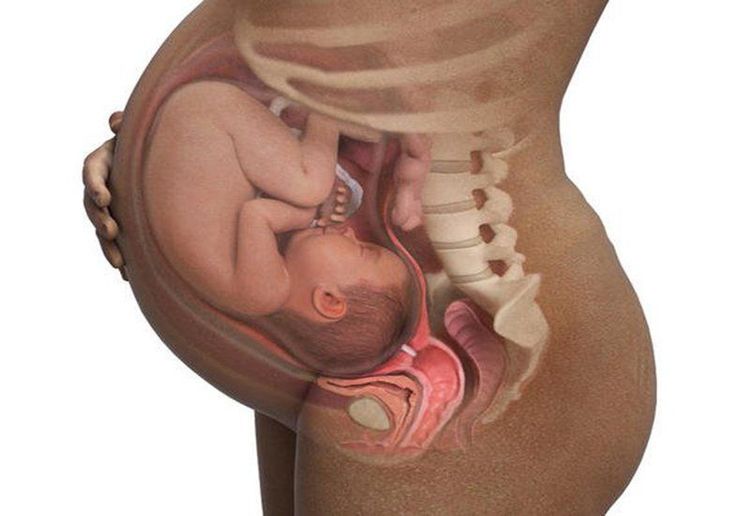The article is professionally consulted by First Degree Specialist Doctor Phạm Thị Yến - Specialist Obstetrician - Department of Obstetrics and Gynecology - Vinmec International General Hospital Hai Phong.
According to statistics, only 5% of women give birth on the exact due date set by the doctor, and many first-time mothers have to wait beyond the due date to welcome their newborn. There are quite a few cases where women who are 40 weeks pregnant show no signs of labor, causing restlessness for the mothers-to-be.
1. How does the mother's body feel at 40 weeks of pregnancy?
At 40 weeks pregnant, the mother is always ready to welcome the moment of meeting the baby. However, before meeting the baby, you will have to go through the difficulties of childbirth. You should pay attention to the baby's movements and inform the doctor immediately if you don't notice the fetus moving much. The baby is now fully developed and will continue to move until the actual labor day, thus many risks that occur during a 40-week pregnancy often see a decrease in intensity of fetal movements.
2. How does a 40-week pregnancy develop?
For pregnancies that last for 40 weeks, the average fetus will weigh about 3.4 kg and measure approximately 50.8 cm in length. However, there are still many babies who are completely healthy with body weights larger or smaller than the average figure mentioned above. At this point, the baby has grown and cannot stay in the mother's womb forever. Additionally, the mother needs to pay attention if the baby's movements slow down or if there is any discharge from the vagina.

3. Is it okay if a 40-week pregnant woman has no signs of labor?
If the pregnant woman does not go into labor within a week from the due date, the doctor may recommend the mother to undergo monitoring tests to record the fetal heart rate and a 40-week ultrasound to observe the baby's movements, ensuring that the baby is receiving enough oxygen and that the nervous system is still responding normally. The doctor will advise the mother on induction or intervention if the baby has not been born by the due date or if there are no signs of labor at 40 weeks.
The condition of being 40 weeks pregnant without any signs of labor is something that makes expectant mothers extremely worried because they fear the fetus might be facing abnormal issues, as most cases either give birth early or late within a 2-week period around the due date. According to many experts, the phenomenon of being 40 weeks pregnant without going into labor or going into labor earlier (from week 37 to week 38) is normal.
However, if this delayed labor condition lasts too long (when the pregnancy exceeds 41 weeks), it will cause the placenta to age, threatening the health and safety of the child. These impacts will significantly affect the fetal heart rate, causing harm to the fetus such as: neurological damage, motor nervous system impairment. In addition, compared to full-term infants, post-term infants are at a higher risk of developing respiratory diseases, infections, high fever, and even death. Moreover, if not detected in time, a post-term fetus can suffer stillbirth or death during labor, as the amniotic fluid in the uterus gradually decreases, and the umbilical cord is compressed with each uterine contraction, making fetal distress more likely.
4. Reasons for a 40-week pregnancy without signs of labor
There are many reasons leading to this situation, most of which are due to the expectant mother providing incorrect information about the start date of her last menstrual period, resulting in the doctor predicting the due date incorrectly. In addition, another reason could be that the mother went for a late prenatal check-up, after the first trimester, making it very difficult for the doctor to accurately determine the due date because at this stage, the fetus is developing very rapidly, and in some cases, the baby even exceeds the standard for each week of pregnancy.
5. Monitoring 40-week long pregnancies without signs of labor
Throughout the pregnancy, women need to have regular check-ups according to the doctor's schedule. When the due date arrives and the pregnant woman still does not see any signs of labor, at this point, the expectant mother needs to go to the hospital for a comprehensive examination by the doctor regarding the condition of the fetus, the degree of placental calcification, umbilical cord function, amniotic membranes, etc.
Depending on the mother's condition, after the examination, the doctor will induce labor by stimulating uterine contractions (by artificially rupturing the membranes or using the hormone oxytocin and other medications). After 24-48 hours, if the mother is stable, she can give birth naturally; otherwise, a cesarean section is mandatory. In the case where a mother is 40 weeks pregnant but is at high risk of danger or has any potential complications, she can request a cesarean section to deliver the baby.
At Vinmec International General Hospital, there is currently a comprehensive maternity service package as a solution to help expectant mothers feel at ease, as they will have the support of a team of doctors throughout the pregnancy. When choosing the comprehensive maternity package, expectant mothers can expect:
- The pregnancy process is monitored by a team of highly specialized doctors.
- Regular check-ups, early detection of abnormalities
- Comprehensive maternity package for a convenient labor process
- Newborns are provided with comprehensive care.
Dr. Phạm Thị Yến has had 11 years of experience in examination and treatment in the field of Obstetrics and Gynecology. She has many strengths and deep knowledge in:
- Examination and consultation for normal pregnancies, pathological pregnancies, and high-risk pregnancies
- Examination and treatment of gynecological diseases: cervicitis, cervical erosion
- Laparoscopic surgery for gynecological diseases: ectopic pregnancy, uterine tumors, ovarian tumors
- Surgery for breast tumors, vulvar tumors, vaginal tumors, cervical tumors
- Obstetric surgery: cesarean section, physical examination
- Treatment of endocrine disorders in women of all ages: puberty, reproductive age, perimenopausal age.
To arrange an appointment, please call … or make your reservation directly HERE. You may also download the MyVinmec app to schedule appointments faster and manage your reservations more conveniently.
















